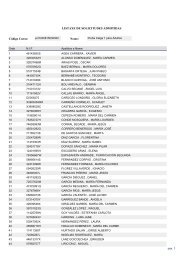- Page 3 and 4:
ACTAS DA VIII CONFERENCIA INTERNACI
- Page 5:
Nota dos editores Recóllense neste
- Page 9 and 10:
Prólogo Celso Currás Fernández C
- Page 11:
DIRECTORIO DA VIII CONFERENCIA INTE
- Page 15 and 16:
Manuel González González Secretar
- Page 17:
Inauguración da VIII Conferencia I
- Page 20 and 21:
— 20 — Viviane Reding códigos
- Page 23 and 24:
Manuel Fraga Iribarne Presidente da
- Page 25:
CONFERENCIAS PLENARIAS
- Page 28 and 29:
— 28 — Robert Lafont administra
- Page 30 and 31:
— 30 — Robert Lafont troubadour
- Page 32 and 33:
— 32 — Robert Lafont Aller plus
- Page 34 and 35:
— 34 — Robert Lafont phonologiq
- Page 36 and 37:
— 36 — Robert Lafont première
- Page 39 and 40:
Unidad del lenguaje y pluralidad de
- Page 41 and 42:
Unidad del lenguaje y pluralidad de
- Page 43 and 44:
Unidad del lenguaje y pluralidad de
- Page 45 and 46:
Unidad del lenguaje y pluralidad de
- Page 47 and 48:
Unidad del lenguaje y pluralidad de
- Page 49 and 50:
Unidad del lenguaje y pluralidad de
- Page 51:
Unidad del lenguaje y pluralidad de
- Page 54 and 55:
— 54 — Jaume Sarramona real de
- Page 56 and 57:
— 56 — Jaume Sarramona ha de ut
- Page 58 and 59:
— 58 — Jaume Sarramona Con todo
- Page 60 and 61:
— 60 — Jaume Sarramona Muestra
- Page 62 and 63:
Resultados por áreas Global (n=132
- Page 64 and 65:
— 64 — Jaume Sarramona MATEMÁT
- Page 66 and 67:
— 66 — Jaume Sarramona comprens
- Page 69 and 70:
Experiencias de enseñanza de la le
- Page 71 and 72:
Experiencias de enseñanza de la le
- Page 73 and 74:
Experiencias de enseñanza de la le
- Page 75 and 76:
Experiencias de enseñanza de la le
- Page 77 and 78:
Experiencias de enseñanza de la le
- Page 79 and 80:
Experiencias de enseñanza de la le
- Page 81 and 82:
Experiencias de enseñanza de la le
- Page 83 and 84:
Experiencias de enseñanza de la le
- Page 85:
Experiencias de enseñanza de la le
- Page 89 and 90:
Terminología y lenguas minoritaria
- Page 91 and 92:
Terminología y lenguas minoritaria
- Page 93 and 94:
Terminología y lenguas minoritaria
- Page 95 and 96:
Terminología y lenguas minoritaria
- Page 97 and 98:
Terminología y lenguas minoritaria
- Page 99 and 100:
Terminología y lenguas minoritaria
- Page 101 and 102:
Terminología y lenguas minoritaria
- Page 103 and 104:
Lenguas Minoritarias y Lenguas Mino
- Page 105 and 106:
Lenguas Minoritarias y Lenguas Mino
- Page 107 and 108:
Lenguas Minoritarias y Lenguas Mino
- Page 109 and 110:
Lenguas Minoritarias y Lenguas Mino
- Page 111 and 112:
Lenguas Minoritarias y Lenguas Mino
- Page 113 and 114:
Lenguas Minoritarias y Lenguas Mino
- Page 115 and 116:
Lenguas Minoritarias y Lenguas Mino
- Page 117 and 118:
Language Policy Implementation: Con
- Page 119 and 120:
Language Policy Implementation: Con
- Page 121 and 122:
Language Policy Implementation: Con
- Page 123 and 124:
Language Policy Implementation: Con
- Page 125 and 126:
Language Policy Implementation: Con
- Page 127 and 128:
Language Policy Implementation: Con
- Page 129 and 130:
A lingua galega nos comezos do novo
- Page 131 and 132:
A lingua galega nos comezos do novo
- Page 133 and 134:
A lingua galega nos comezos do novo
- Page 135 and 136:
A lingua galega nos comezos do novo
- Page 137 and 138:
A lingua galega nos comezos do novo
- Page 139 and 140:
A lingua galega nos comezos do novo
- Page 141 and 142:
A lingua galega nos comezos do novo
- Page 143 and 144:
A lingua galega nos comezos do novo
- Page 145 and 146:
A lingua galega nos comezos do novo
- Page 147:
A lingua galega nos comezos do novo
- Page 151 and 152:
Recursos e actividades necesarias p
- Page 153 and 154:
Recursos e actividades necesarias p
- Page 155 and 156:
Recursos e actividades necesarias p
- Page 157 and 158:
El euskera y las tecnologías del h
- Page 159 and 160:
El euskera y las tecnologías del h
- Page 161 and 162:
El euskera y las tecnologías del h
- Page 163 and 164:
Las tecnologías del habla en lengu
- Page 165 and 166:
Las tecnologías del habla en lengu
- Page 167 and 168:
Las tecnologías del habla en lengu
- Page 169:
Las tecnologías del habla en lengu
- Page 172 and 173:
— 172 — Mª Liliana Martínez C
- Page 174 and 175:
Mª Liliana Martínez Calvo unha de
- Page 177 and 178:
Nuevas perspectivas en la enseñanz
- Page 179 and 180:
Nuevas perspectivas en la enseñanz
- Page 181 and 182:
Nuevas perspectivas en la enseñanz
- Page 183 and 184:
Nuevas perspectivas en la enseñanz
- Page 185 and 186:
Trilingual Education & Language Min
- Page 187 and 188:
Trilingual Education & Language Min
- Page 189 and 190:
Trilingual Education & Language Min
- Page 191 and 192:
Trilingual Education & Language Min
- Page 193:
Trilingual Education & Language Min
- Page 196 and 197:
Félix Etxeberría desaparecer el m
- Page 198 and 199:
Félix Etxeberría ñanza secundari
- Page 200 and 201:
Félix Etxeberría se está llevand
- Page 202 and 203:
Félix Etxeberría niños y niñas
- Page 204 and 205:
Miguel Pérez Pereira reflexións e
- Page 206 and 207:
Miguel Pérez Pereira galega e cast
- Page 208 and 209:
Miguel Pérez Pereira O problema co
- Page 210 and 211:
Celia Ruiz gen, mientras brinda -po
- Page 212 and 213:
Celia Ruiz las familias tendían a
- Page 214 and 215:
Celia Ruiz cierto modo, son el equi
- Page 217 and 218:
Problemática do ensino bilingüe e
- Page 219 and 220:
Problemática do ensino bilingüe e
- Page 221 and 222:
Problemática do ensino bilingüe e
- Page 223 and 224:
Problemática do ensino bilingüe e
- Page 225:
SIMPOSIO PROBLEMAS DE HOXE NO ENSIN
- Page 228 and 229:
Pilar Buela ciais que constitúen a
- Page 230 and 231:
Pilar Buela • Para as xeracións
- Page 233 and 234:
¿Existe un modelo de fala para a c
- Page 235 and 236:
¿Existe un modelo de fala para a c
- Page 237 and 238:
¿Existe un modelo de fala para a c
- Page 239 and 240:
¿Existe un modelo de fala para a c
- Page 241 and 242:
¿Existe un modelo de fala para a c
- Page 243 and 244:
A formación do profesorado de ling
- Page 245 and 246:
Aformación de profesorado de lingu
- Page 247 and 248:
Aformación de profesorado de lingu
- Page 249:
Aformación de profesorado de lingu
- Page 253 and 254:
Política lingüística y educativa
- Page 255 and 256: Política lingüística y educativa
- Page 257: Política lingüística y educativa
- Page 260 and 261: Josep Vicent Felip i Monlleó sin
- Page 262 and 263: Josep Vicent Felip i Monlleó -Prog
- Page 264 and 265: Josep Vicent Felip i Monlleó Para
- Page 266 and 267: Xesús P. González Moreiras Non é
- Page 268 and 269: Lluís Jou i Mirabet tivo, que se e
- Page 270 and 271: Lluís Jou i Mirabet Esta ha sido l
- Page 272 and 273: Joan Melià güísticas, debe enten
- Page 274 and 275: Joan Melià do impulso de determina
- Page 276 and 277: Joan Melià proceso de normalizaci
- Page 278 and 279: Pedro Pegenaute Garde en demasiadas
- Page 280 and 281: Pedro Pegenaute Garde de la políti
- Page 282 and 283: Pedro Pegenaute Garde De donde se d
- Page 285: MESA REDONDA POLÍTICA LINGÜÍSTIC
- Page 288 and 289: Diego Corraine El 2 de mayo 2001, c
- Page 290 and 291: Diego Corraine adolescentes hasta l
- Page 292 and 293: Diego Corraine blemas económicos y
- Page 295 and 296: Policy and the teaching of Frisian
- Page 297 and 298: Policyand the teaching of Frisian a
- Page 299 and 300: Policyand the teaching of Frisian a
- Page 301: Policyand the teaching of Frisian a
- Page 304 and 305: Philippe Martel • Breton is the c
- Page 308 and 309: Philippe Martel somewhat boorish me
- Page 310 and 311: Glyn Williams claims about how the
- Page 312 and 313: Glyn Williams SMEs within the Europ
- Page 314 and 315: Glyn Williams connected to the high
- Page 316 and 317: Glyn Williams Economy rationality i
- Page 318 and 319: Glyn Williams operators could extra
- Page 320 and 321: Glyn Williams the firm. It goes bey
- Page 322 and 323: Glyn Williams the abstract represen
- Page 324 and 325: Glyn Williams process across differ
- Page 326 and 327: Glyn Williams 4. Language, the soci
- Page 328 and 329: Glyn Williams Culture is universal
- Page 330 and 331: Glyn Williams Haugen, E. (1959):
- Page 333: COMUNICACIÓNS LIBRES
- Page 336 and 337: Andrés Alonso Álvarez A actual Co
- Page 338 and 339: Andrés Alonso Álvarez é prescind
- Page 340 and 341: Andrés Alonso Álvarez noso caso n
- Page 342 and 343: Andrés Alonso Álvarez naquelas di
- Page 345 and 346: A normalización terminolóxica en
- Page 347 and 348: A normalización terminolóxica en
- Page 349 and 350: A normalización terminolóxica en
- Page 351: A normalización terminolóxica en
- Page 354 and 355: Mª del Pilar Alvariño Alvariño e
- Page 356 and 357:
Mª del Pilar Alvariño Alvariño e
- Page 358 and 359:
Mª del Pilar Alvariño Alvariño e
- Page 360 and 361:
Mª del Pilar Alvariño Alvariño e
- Page 362 and 363:
Carlos Arias Iglesias A idea fundam
- Page 364 and 365:
Carlos Arias Iglesias parte, contar
- Page 366 and 367:
Carlos Arias Iglesias unha análise
- Page 368 and 369:
M. Baña Castro / R. Mª García Su
- Page 370 and 371:
M. Baña Castro / R. Mª García Su
- Page 372 and 373:
M. Baña Castro / R. Mª García Su
- Page 374 and 375:
M. Baña Castro / R.Mª García Su
- Page 376 and 377:
M. Baña Castro / R.Mª García Su
- Page 378 and 379:
M. Baña Castro / R.Mª García Su
- Page 380 and 381:
M. Baña Castro / R.Mª García Su
- Page 382 and 383:
M. Baña Castro / R.Mª García Su
- Page 384 and 385:
M. Baña Castro / R.Mª García Su
- Page 387 and 388:
El pluralismo cultural en los progr
- Page 389 and 390:
El pluralismo cultural en los progr
- Page 391 and 392:
El pluralismo cultural en los progr
- Page 393 and 394:
El pluralismo cultural en los progr
- Page 395:
El pluralismo cultural en los progr
- Page 398 and 399:
Teresa Bermúdez / Amparo Cereixo C
- Page 400 and 401:
Teresa Bermúdez / Amparo Cereixo m
- Page 402 and 403:
Teresa Bermúdez / Amparo Cereixo e
- Page 404 and 405:
Teresa Bermúdez / Amparo Cereixo d
- Page 406 and 407:
Camilo Brandín Feijoo encerra un n
- Page 408 and 409:
Camilo Brandín Feijoo obrigatoriam
- Page 410 and 411:
Camilo Brandín Feijoo 6. Resultado
- Page 412 and 413:
Camilo Brandín Feijoo Kroll, J. F.
- Page 414 and 415:
Carlos Caetano Biscaino Fernandes /
- Page 416 and 417:
Carlos Caetano Biscaino Fernandes /
- Page 418 and 419:
Carlos Caetano Biscaino Fernandes /
- Page 420 and 421:
Carlos Manuel Callón Torres (SLG)
- Page 422 and 423:
Carlos Manuel Callón Torres máis
- Page 424 and 425:
Carlos Manuel Callón Torres Seitur
- Page 426 and 427:
Berta Castaño Torrado / Blanca Sá
- Page 428 and 429:
Berta Castaño Torrado / Blanca Sá
- Page 430 and 431:
Berta Castaño Torrado / Blanca Sá
- Page 432 and 433:
Berta Castaño Torrado / Blanca Sá
- Page 434 and 435:
Xosé-Henrique Costas González o s
- Page 436 and 437:
Xosé-Henrique Costas González col
- Page 438 and 439:
Xosé-Henrique Costas González Pol
- Page 441 and 442:
Competencia bilingüe e autotraducc
- Page 443 and 444:
Competencia bilingüe e autotraducc
- Page 445 and 446:
Competencia bilingüe e autotraducc
- Page 447 and 448:
Competencia bilingüe e autotraducc
- Page 449 and 450:
Competencia bilingüe e autotraducc
- Page 451 and 452:
Competencia bilingüe e autotraducc
- Page 453 and 454:
Os lectorados de galego. Funcións
- Page 455 and 456:
Os lectorados de galego. Funcións
- Page 457:
Os lectorados de galego. Funcións
- Page 460 and 461:
Sonia Fernández Parrat público e
- Page 462 and 463:
Sonia Fernández Parrat publicaron
- Page 464 and 465:
Sonia Fernández Parrat Teoricament
- Page 467 and 468:
TRADOS 5 Alberto González Introduc
- Page 469 and 470:
Trados 5 configuración de proyecto
- Page 471 and 472:
Algunas consideraciones sobre la si
- Page 473 and 474:
Algunas consideraciones sobre la si
- Page 475 and 476:
Algunas consideraciones sobre la si
- Page 477:
Algunas consideraciones sobre la si
- Page 480 and 481:
Manuel González González et al. b
- Page 482 and 483:
Manuel González González et al. a
- Page 484 and 485:
Manuel González González et al. 2
- Page 486 and 487:
Manuel González González et al. e
- Page 488 and 489:
Manuel González González et al. W
- Page 490 and 491:
Margarita González González / Mó
- Page 492 and 493:
Margarita González González / Mó
- Page 494 and 495:
Margarita González González / Mó
- Page 496 and 497:
Margarita González González / Mó
- Page 498 and 499:
Marta González Louzao No ano 1999
- Page 500 and 501:
Marta González Louzao nómicas, de
- Page 502 and 503:
Marta González Louzao alumnos matr
- Page 504 and 505:
Vitelio Herrera 1.2. Objetivos espe
- Page 506 and 507:
Vitelio Herrera Sin embargo, es imp
- Page 508 and 509:
Xosé L. Janeiro Espiñeira Poder X
- Page 510 and 511:
Xosé L. Janeiro Espiñeira colisi
- Page 512 and 513:
Xosé L. Janeiro Espiñeira compren
- Page 514 and 515:
Xosé L. Janeiro Espiñeira lingua
- Page 517 and 518:
El uso oficial de los idiomas mayas
- Page 519 and 520:
El uso oficial de los idiomas mayas
- Page 521:
El uso oficial de los idiomas mayas
- Page 524 and 525:
Sabela Labraña Barrero non chega,
- Page 526 and 527:
Sabela Labraña Barrero tiveron nec
- Page 528 and 529:
Sabela Labraña Barrero Finalmente,
- Page 530 and 531:
Sabela Labraña Barrero centro pion
- Page 533 and 534:
Movilidad estudiantil y lengua: el
- Page 535 and 536:
Movilidad estudiantil y lengua: el
- Page 537:
Movilidad estudiantil y lengua: el
- Page 540 and 541:
María Sol López Martínez / Franc
- Page 542 and 543:
María Sol López Martínez / Franc
- Page 545 and 546:
A extensión da lingua galega no á
- Page 547 and 548:
A extensión da lingua galega no á
- Page 549 and 550:
A extensión da lingua galega no á
- Page 551 and 552:
A extensión da lingua galega no á
- Page 553 and 554:
A extensión da lingua galega no á
- Page 555 and 556:
A adquisición da competencia tradu
- Page 557 and 558:
Aadquisición da competencia traduc
- Page 559 and 560:
Aadquisición da competencia traduc
- Page 561 and 562:
Aadquisición da competencia traduc
- Page 563 and 564:
Cómo ensinar a lingua e a cultura
- Page 565 and 566:
Cómo ensinar a lingua e a cultura
- Page 567 and 568:
Cómo ensinar a lingua e a cultura
- Page 569:
Cómo ensinar a lingua e a cultura
- Page 572 and 573:
Mónica Martínez Baleirón / Mª d
- Page 574 and 575:
Mónica Martínez Baleirón / Mª d
- Page 576 and 577:
Mónica Martínez Baleirón / Mª d
- Page 578 and 579:
Mónica Martínez Baleirón / Mª d
- Page 581 and 582:
The value of Galician and Irish on
- Page 583 and 584:
The value of Galician and Irish on
- Page 585 and 586:
The value of Galician and Irish on
- Page 587 and 588:
Importancia dos diccionarios biling
- Page 589 and 590:
Importancia dos diccionarios biling
- Page 591 and 592:
Importancia dos diccionarios biling
- Page 593 and 594:
Importancia dos diccionarios biling
- Page 595 and 596:
Lengua de signos española: situaci
- Page 597 and 598:
Lengua de signos española: situaci
- Page 599 and 600:
Evaluación actual y futura de la v
- Page 601 and 602:
Evaluación actual y futura de la v
- Page 603 and 604:
Evaluación actual y futura de la v
- Page 605 and 606:
Evaluación actual y futura de la v
- Page 607:
Evaluación actual y futura de la v
- Page 610 and 611:
Miguel Anxo Santos Rego et al. Aná
- Page 612 and 613:
Miguel Anxo Santos Rego et al. Por
- Page 615 and 616:
La actitud y el uso lingüísticos:
- Page 617 and 618:
La actitud y el uso lingüísticos:
- Page 619 and 620:
La actitud y el uso lingüísticos:
- Page 621:
La actitud y el uso lingüísticos:
- Page 624 and 625:
Diego Vázquez Rei Valoración da l
- Page 626 and 627:
Diego Vázquez Rei Outras habilidad
- Page 628 and 629:
Diego Vázquez Rei Precisión e cla
- Page 630 and 631:
Kateina Vlasáková checas e españ
- Page 632 and 633:
Kateina Vlasáková amplamente vert
- Page 634 and 635:
Kateina Vlasáková obxectivos dest
- Page 636 and 637:
Kateina Vlasáková motivan ós est
- Page 639 and 640:
Los centros de autoaprendizaje: un
- Page 641 and 642:
Los centros de autoaprendizaje: un
- Page 643 and 644:
Los centros de autoaprendizaje: un
- Page 645 and 646:
Los centros de autoaprendizaje: un
- Page 647 and 648:
Los centros de autoaprendizaje: un
- Page 649 and 650:
La integración del aula de autoapr
- Page 651 and 652:
La integración del aula de autoapr
- Page 653 and 654:
La integración del aula de autoapr
- Page 655 and 656:
La integración del aula de autoapr
- Page 657 and 658:
CONCLUSIÓNS Ó longo de tres días
- Page 659 and 660:
ORGANIZACIÓN DA IX CONFERENCIA INT
- Page 663 and 664:
TÁBOA DE CONTIDOS NOTA DOS EDITORE
- Page 665 and 666:
XABIER AIZPURUA Política lingüís
- Page 667 and 668:
JOSÉ LUIS JANEIRO Cooficialidade l


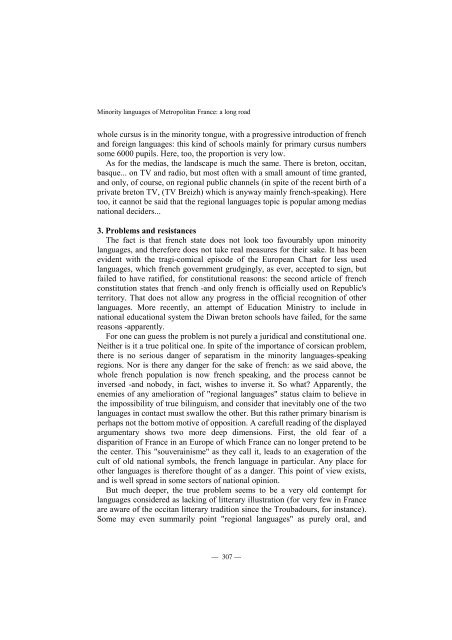

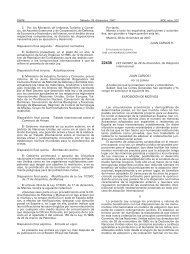
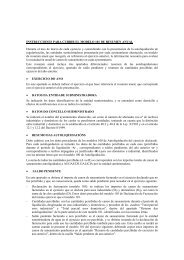


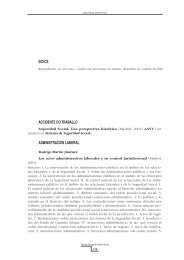




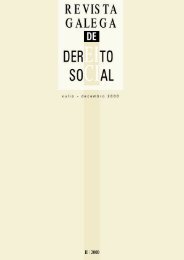


![BULGARIA: contrato de intermediación-MIMO [PDF] - Xunta de Galicia](https://img.yumpu.com/32676180/1/184x260/bulgaria-contrato-de-intermediacian-mimo-pdf-xunta-de-galicia.jpg?quality=85)
